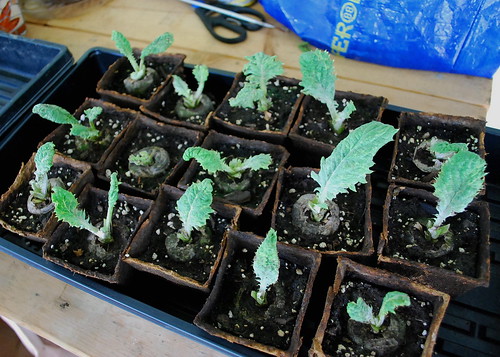
What was once this...

...is now THIS! I have tried everything in my power to get rid of these f@%#&!g aphids and still they bounce back each time. In an attempt to kill every last one of them, I even tried dunking the entire plant into an organic pesticide solution. Sadly, that didn't work either. To make matters worse, the organic pesticides I used (even insecticidal soap spray) burned through the leaves and my only option was to cut them off. But the worst part is that the new leaves never develop properly because the life is literally being sucked out of them.
I don't care what anyone says, aphids are a formidable enemy. At this point, I am ready to throw in the towel. Not only have they cost me much time, money and aggravation during these past couple of months but in all honesty, I can't even stand the sight of these plants now. Also, I refuse to let these aphids migrate into my garden. So I say treat these sorry plants like you would any ex-lover - pretend they are dead and move on.

Call it divine providence or just good luck but this past weekend, I came across these beauties (Imperial artichokes to boot) at Lake Street Garden Center in Salem, New Hampshire. I knew the moment I laid eyes on them that my enemy's days were numbered. This morning, I happily threw away all of my infected plants. The way I see it, there's enough suffering in this world. After what I'd been through, at 3 dollars each, these flawless artichoke plants were a steal.
Again, the lesson to be learned here is: no matter how reputable the nursery (in this case, Companion Plants out of Ohio), you must always quarantine your new plants until you are SURE they will not introduce a foreign pathogen or pest that will infect and potentially kill the rest of your houseplants.






Yikes. The quarantining never occurred to me, but makes perfect sense. Sometimes, experience is the best teacher.
ReplyDeleteI'm so sorry, Thomas. Did the aphids come in on your Chrysanthemum tea plants? I'm leaving all my seedlings outside tonight, their first night out of the shed, and now the wind has come up. I hope I don't end up losing all my peppers! It seems as though we are always taking chances with our "babies".
ReplyDeleteGran - YES! Winnie or "Mac" who ordered the same plants from the same company got them too. I wrote a scathing review about the nursery on Dave's Garden today. They deserve it.
ReplyDeleteIronically enough, the chrysanthemum are now thriving and showing no signs of infection. I know that artichokes were highly susceptible to aphids. I think the insects burrow into the succulent leaves or lay their eggs in there to protect themselves.
I'm so sorry you have to go through this, of the 3 chrysanthemums I got, 2 response to homemade insecticide soap and are thriving, one is somewhat stunt, I drench it with BT today.
ReplyDeleteHow frustrating....I'm sorry you lost your plants...My roses (which I'm not really fond of anyway) are always covered in the stupid aphids...In fact, I leave the rose bush alone just so they eat it and not my veggies lol : )
ReplyDeleteUgh! Aphids are such nonsense. I too accidentally introduced mealybugs into my garden from a nursery bought plant and am still fighting to eradicate it!
ReplyDeleteSorry about your plants.
Good riddance to the aphids and as sad as it is to have to sacrifice plants for the greater good - you got to do what you got to do!
ReplyDeleteI hope you new plants produce beautifully for you to make up for your troubles.
I am so sorry about your artichokes. There are so many organic ways to fight them, but when they are there, it seems that nothing works.
ReplyDeleteLast year I had them on my beans. I have tried to cover them in wood ashes, spray them with nettle juice... nothing worked. This year I have planted summer savory all around, this should keep my beans safe from aphid attack.
Garbage is sometimes the best home for pest ridden plants.
ReplyDeleteDid you ever try a gentle dusting with dolomite powder? I have used it wth mixed success; but it is always worth a try.
Susan
http://susan-chicdaisy.blogspot.com/
You should burn all of their belongings and pictures as well. You need closure.
ReplyDeleteI'm starting to see aphids here and there. I keep squishing them, but I'm afraid it will get worse before it gets better.
How frustrating! I know it must have been difficult to trash the seedlings that you raised and cared for, but it was a good decision considering they were weakened and posed a danger to other plants in your garden.
ReplyDeleteThanks for blogging about your experience. I learned about plant quarantine today.
I am laughing at Ribbit's comment! Are they definitely aphids? I have never had them on my seedlings, but I had lots of fungus gnats last year due to having damp peat pots. It seems the aphids have a few of my perennial ornamentals they prefer over my veggies thankfully. I'm sure my time will come! Well, at least you found some new stock and can move on with your plans! My artichokes are growing very slowly in the ground, I think I put them in way too late down here, they should have been in late Feb here, they don't like heat at all. It looks like Artichokes are turning into the veggie gardeners "Roses", having to worry and mess with them constantly, LOL!
ReplyDeleteI'm glad you found a solution to your artichoke problem, even if it was terminal! Aphids are really a formidable pest to get rid of, and perhaps the artichokes are less tolerant of them. I've been fortunate, my artichokes are ok but I have black aphids on some of my chives. They are responding to insecticidal soap.
ReplyDeleteI highly recommend insect barrier. We used it for our eggplants 2/2 flea beetles and it worked beautifully. I have to say that aphids will be there and everywhere. They come on almost everything. If it ends up being a problem, using aphid parasites may help. Also, use trap plants similar to the idea by Sunny, so they'll eat certain plants while leaving the rest of the garden alone. For me, it's my native honeysuckle (Lonicera sempervirens). The honeysuckle grows so fast that even an aphid attack does nothing to it, it's unreal. Good luck! Anna
ReplyDeleteOh how sad. Pests are one of the reasons I don't like to have houseplants. Too much agony. In the garden the good bugs keep the bad bugs in check (mostly) but inside it is so hard to control. I remember one year buying tomato transplants and getting a white fly infestation in my garden. You do have to be careful of what you buy from others.
ReplyDeleteSorry Thomas. I will say I didn't read all the responses and I am not a plant person (hey I killed a plastic plant), but I have read many times that a good solution for aphids is powdered milk. You make a lightly milk solution and spray the leaves, not that you want to try that now, but atleast if you have to deal with aphids in the future.
ReplyDeleteOn a posative note, when a friend moved to VA last year she was going to toss this rather pathetic looking spider plant. I figured since it was already half dead it wouldn't matter if I took it and killed it. Not only has it made it through the winter, its got new shoots. I will need to transplant it soon to prevent root stunting (or whatever you gardeners call it ;), but I thought I would share some good to go with the bad.
Sorry about your first batch of artichoke plants. The new ones look great. I have been having artichoke problems as well. Mine arrived not looking very happy. They are sending me some new ones though. Good luck!
ReplyDeleteAphids, bleah! I hope you've also sent a scathing email to the nursery as well, they need to know what they are responsible for. I'm sorry that I found that place for you.
ReplyDeleteAphids have done a lot of damage in my garden. But I am happy to report that since I've been growing a lot of plants that are attractive to beneficial insects that the aphid populations have been kept in check. I watched a hover fly larvae eat an aphid on one of my pepper plants the other day, it was amazing to watch.
I think you made the right decision. We battle aphids on our kale and broccoli plants all summer and it can be quite frustrating. I'm just happy that they remain pest free during the spring and winter months. I hope you have better luck with your Imperial artichokes, they look like very nice little plants.
ReplyDeleteThanks everyone for your comments. A few of them made me laugh.
ReplyDeleteErin- yes, they are aphids. Little green ones. And coincidentally, I'm battling gnats myself. They don't seem to be as distructive though.
Michelle - nothng to be sorry about. I did get the plants I was looking for, and a bit more. Hahaha.
Thomas, I had a problem with gnats. I mixed a solution of water and vanilla extract and sprayed the plants with it. It worked great and also smells wonderful.
ReplyDeleteDarn. That is too bad Thomas, I am sorry you have losing the battle- hopefully things will improve from here!!
ReplyDeleteDon't feel lonely, my wife and I have had bad experiences when we first started gardening. I tried many organic pesticides only to find that the aphids keep coming back for more. They are cute creatures but damaging to the success of your garden. Keep up the great work with your articles and please stop by my health blog sometime. The web address is http://healthy-nutrition-facts.blogspot.com/.
ReplyDeleteSorry to read about your aphid problem, but seems you did the best thing by getting rid of them. I want to compliment you on the beautiful pics you attach to your updates. Writing to you from one of the Caribbean islands!
ReplyDeleteTo bad about the artichokes! I have never had aphids that bad, crazy.
ReplyDelete